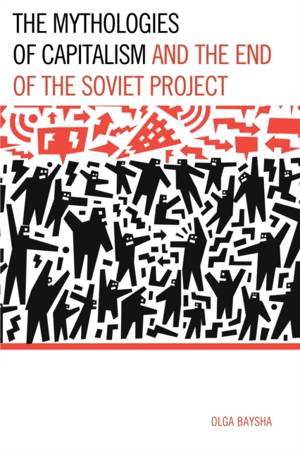
- Afhalen na 1 uur in een winkel met voorraad
- Gratis thuislevering in België vanaf € 30
- Ruim aanbod met 7 miljoen producten
- Afhalen na 1 uur in een winkel met voorraad
- Gratis thuislevering in België vanaf € 30
- Ruim aanbod met 7 miljoen producten
Zoeken
€ 203,95
+ 407 punten
Omschrijving
The purpose of The Mythologies of Capitalism and the End of the Soviet Project is to show that in order to understand popular disillusionment with democratization, liberalization, and other transformations associated with the attempts of non-Western societies to appropriate the ideas of Western modernity, one must consider how these ideas are mythologized in the course of such appropriations. Olga Baysha argues that the seeds of popular post-revolutionary frustration should be sought in pre-revolutionary discourses on democracy, liberalism, and other concepts of Western modernity that are produced outside local contexts and introduced through the channels of global communication and the interpretations of politicians, activists, and experts. Analyzing the opinions of working people and intellectuals published in two Ukrainian newspapers of perestroika times, the author shows how the concepts of democracy, the market, and the West acquired schizophrenic mythical significations. The study is situated within the context of Ulrich Beck's theory of world risk society and Gregory Bateson's theory of schizophrenia as communicative disorder. The author argues that schizophrenic mythologies constructed through globalized networks can lead to disorientation, frustration, and the sense of uncertainty and insecurity on the part of mass publics.
Specificaties
Betrokkenen
- Auteur(s):
- Uitgeverij:
Inhoud
- Aantal bladzijden:
- 184
- Taal:
- Engels
Eigenschappen
- Productcode (EAN):
- 9780739188026
- Verschijningsdatum:
- 14/08/2014
- Uitvoering:
- Hardcover
- Formaat:
- Ongenaaid / garenloos gebonden
- Afmetingen:
- 150 mm x 231 mm
- Gewicht:
- 408 g

Alleen bij Standaard Boekhandel
+ 407 punten op je klantenkaart van Standaard Boekhandel
Beoordelingen
We publiceren alleen reviews die voldoen aan de voorwaarden voor reviews. Bekijk onze voorwaarden voor reviews.











